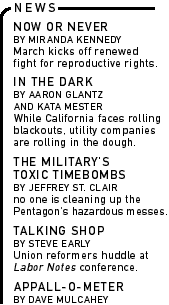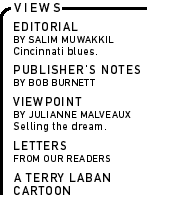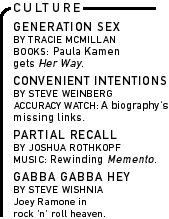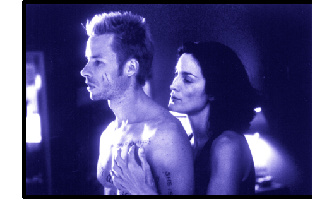

|

|

|

|
| |
|
|
|
Memento Returning to the scene of your crime is, generally speaking, not the swiftest idea. So goes the lesson of one too many a half-mastermind who ever lingered over a job well done. That said, it is possible to get away with it, especially if you're young, audacious and British-born--like director Christopher Nolan, who pulls off something perversely close with his Memento, a murder mystery told from back to front. That makes the first victim the killer, right? Not so fast. Armed with a confidence just short of stupefying--this is only his second feature--Nolan boldly shoots first and asks questions later: We start on a point-blank mess, the film's first blown mind (literally). Actually it's a Polaroid snapshot of the corpse, but wait a moment and the image starts to fade to gray; an impatient hand finally shakes it clean of all transgressions, deep red or otherwise. Blood? What blood? Nolan can't keep this camera trickery up forever (and you wouldn't want him to, unless you were living in a black hole) but what he quickly settles into is just as wicked: a reverse chronology with each scene chasing the tail of the previous one. Memento may be the first whodunit to dispose of the who, the done and the it; these we already know (that is, if our eyes are to be trusted) en route toward deeper pleasures of questionable motives, doubt and blurred identity. It's diabolical stuff, the kind of art-noir designed to beg the employ of entire filmclubs of amateur sleuths, as did its crafty older cousins, Blow Up and Don't Look Now. Puzzle-solving demands varying levels of faith, the merest being a presumption of
Perhaps it's here that I felt my own condition coming on, but that's largely the point; Memento would only be half as fun with only one gimmick or the other. Instead, the backward storytelling and the frozen man make for a wonderful pair, combining into something far more redemptive than it sounds. You never know what's up next--except for the fact that it actually came last--and suddenly we've become lost Leonards ourselves. Moreover, Leonard may be busy avenging his wife's murder (no small feat for someone who has to remind himself to shave every morning), but since his quest appears fulfilled from the start, we're free to work on solving him; and that's going to take some scrutiny. Primarily, there's his "system," an assiduous compilation of scribbled notes, Polaroids and (most arrestingly) a troubled scrawl of tattoos covering his entire torso. Leonard needs these just to pick up his investigation day by day, but their boldface speaks beyond necessity to a kind of consumption: "Yeah, I got a reason," he says, gazing in a mirror at some conveniently inverted text running across his chest that reads, "JOHN G. RAPED AND MURDERED MY WIFE." It's more than a little spooky; Leonard's not your everyday Dirty Harry bent on a revenge-fest but a disciplined masochist--a onetime insurance investigator permanently inked with "The Facts" of his prey's identity. (Hell hath no fury like the literal-minded.) Guy Pearce modulates what might have been a one-note part with just the right amount of bitterness: He's a bit of a prick, but who can blame him? (Not that he'd remember anyway.) There's a clipped menace to his whole conception: the electrified hair, the chirps from his Jaguar's car alarm, the two vertical slashes running down his left cheek. Leonard likes to bring up the story of one of his old cases (he can still remember things from before the accident)--a policy-holder named Sammy who once claimed the same debilitating mental condition as his--and when he does, it's with the slightest superiority of a former bullshit detector who can't unlearn old habits. But Nolan, with good humor, relishes in running blitzes on his stubborn character, as he does with a brief montage of Leonard's softer memories of his wife--so unlike the cold hard facts he swears by--that lulls a diner conversation down to a buzz of lights. Memory is treachery (this Leonard knows; it's written on his arm), though not for the reason he claims--its fallibility--but in the way it sandbags him with unbearable richness from across his oblivion. Elsewhere his frustrations seem like inspired evocations of noir conventions, like waking up next to a mysterious woman he can't remember, or forgetting in mid-stride if he's chasing a thug or being chased himself. All this hot pursuit takes place in and around Los Angeles, site of so many a noir nail-nibbler from D.O.A. to Blade Runner. The city, though, is hardly the Chandleresque maze of smoky parlors and deep shadows you might expect, but a washed-out prefab zone of blue-doored motel rooms over whose transoms slide mysterious letters. (Think the hyperrealism of David Lynch's Lost Highway and you've got it.) As tour guides, Leonard is given an angel and a devil for each shoulder, though I'll leave you to decide which is which: the grinning Teddy (Joe Pantoliano) or the leonine Natalie (Carrie-Anne Moss). Both performers played a similar advisory tagteam on Keanu Reeves' plunge into The Matrix; like that film's hero, Leonard grows uncertainly into knowledge and power, a loose cannon attracting several handlers to help him with his aim. By the time Memento blooms into its exciting beginnings,
its recoil has far less sting than this slippery psychology, and
one applauds Nolan's daring out of sheer respect. Not every vengeance
machine would merit the curiosity of a Leonard, whose future seems
far from certain: "How am I supposed to heal if I can't feel time?"
With damaged minds such as these, the speculation runs endless--until
there's no more room for tattoos. Joshua Rothkopf frequently reviews films for In These Times. He can be reached at JoshRoth@aol.com.
|


